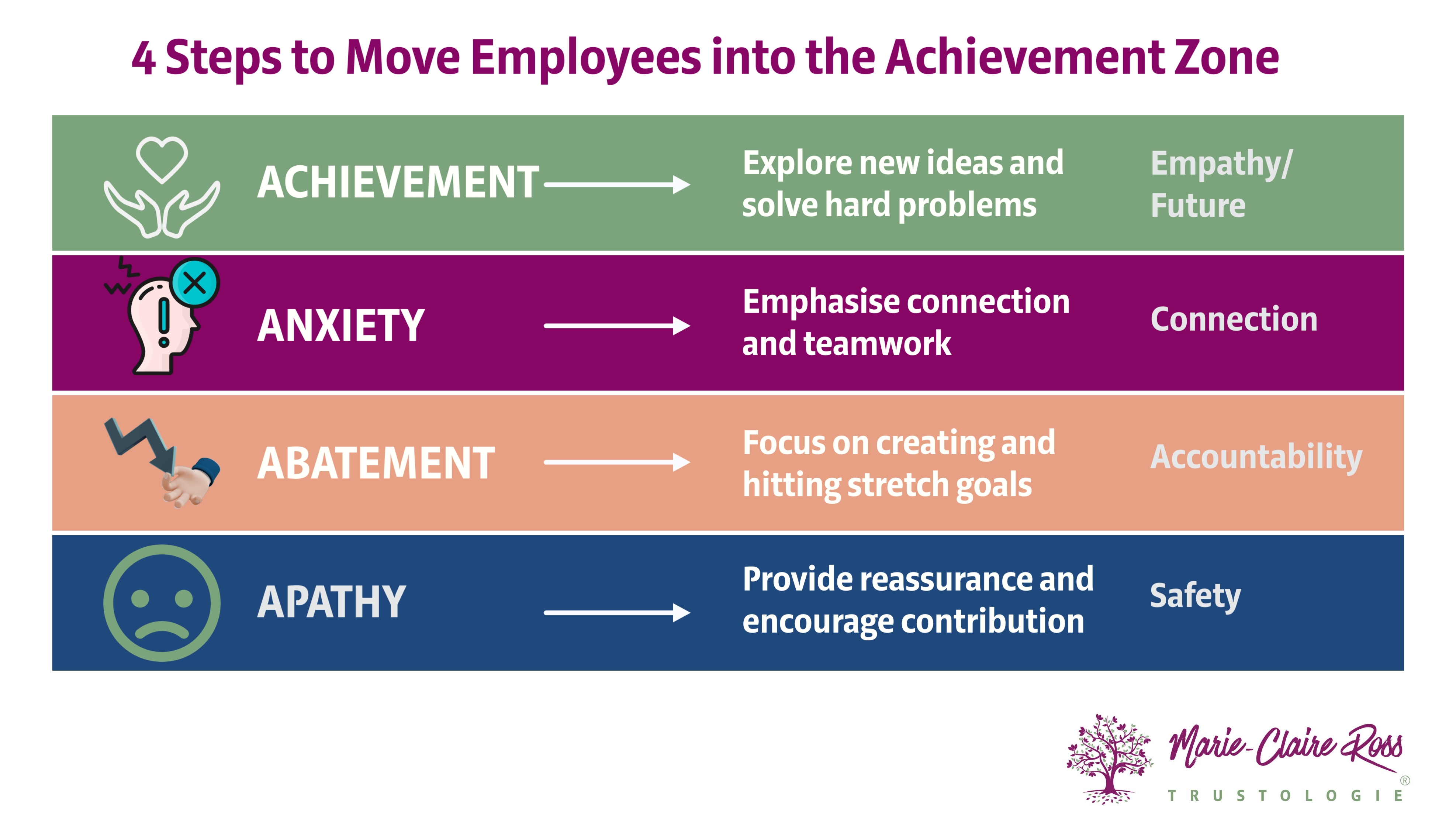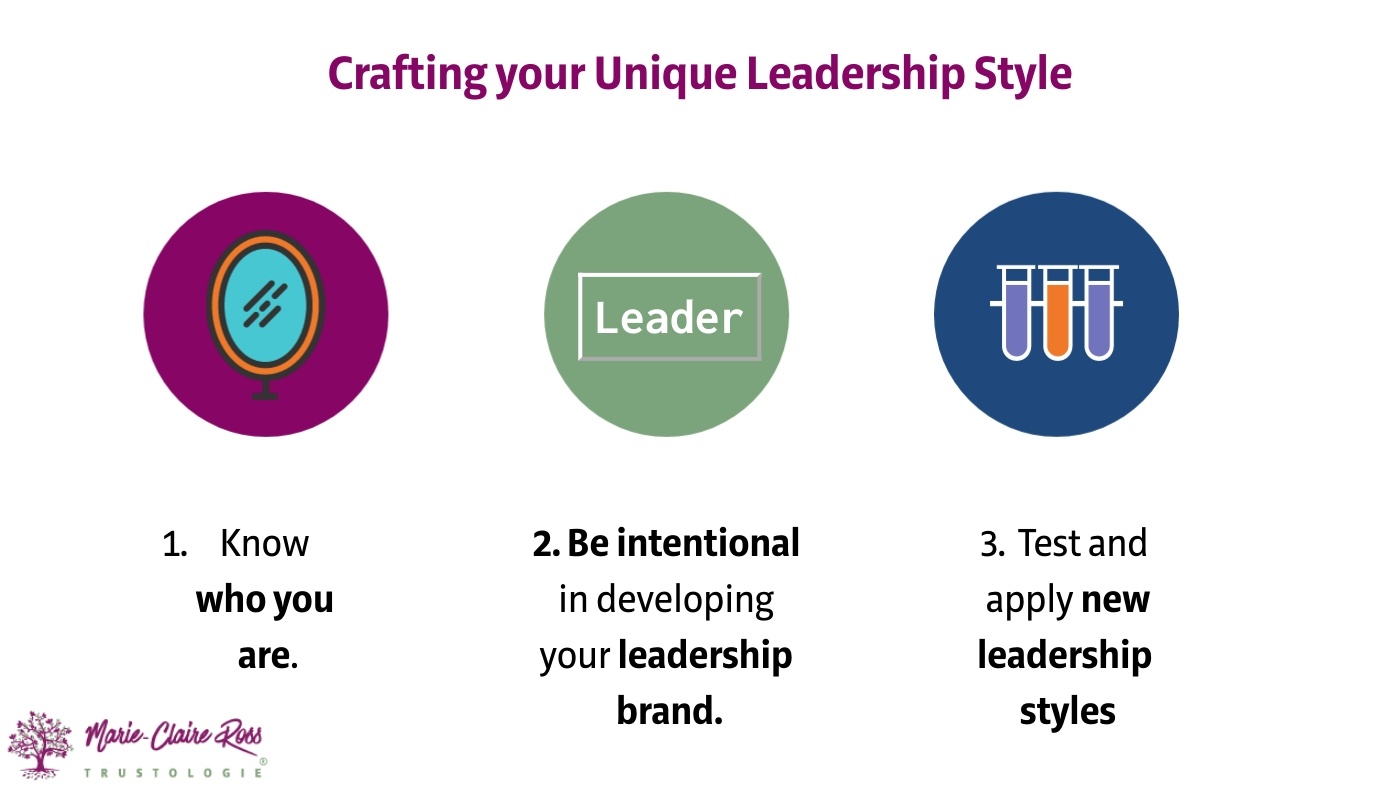11 min read
4 Practical Strategies for Better Emotional Management in the Workplace
I have a friend who often finds herself at the mercy of her emotions. Recently, she called me to rehash a confrontation she’d had with a group of...
Develop leaders, strengthen executive teams and gain deep insights with assessments designed to accelerate trust and performance.

Transform how your leaders think and perform with keynotes that spark connection, trust and high-performance cultures.

Explore practical tools, thought-leadership and resources to help you build trusted, high-performing teams.

Trustologie® is a leadership development consultancy founded by Marie-Claire Ross, specialising in helping executives and managers build high-trust, high-performing teams.


We are living in unusual times. World over, people are exhausted, depleted and anxious about the future. The constant uncertainty that we are all living under has taken a heavy toll.
We are all in the same boat - leaders and employees alike are all under pressure.
Except if you are a leader you are in a unique position - your behaviours and actions work towards stewarding a culture of health. You have the power and influence to make things better for your people, and yourself. How you lead creates a culture of wellbeing and ensures people don't dread going to work. When we feel anxious about work it reduces our mental capacity and ability to solve problems.
The days of leaders "riding people" to get the most out of them is starting to look - well, barbaric. If there is one thing the pandemic has done well is shone a light on the types of workplaces people don't want anymore.
Chaotic organisations with leaders who set unrealistic expectations, provide limited direction and change their mind frequently adds to people's anxiety.
And what I am seeing in my coaching practice is that people aren't sticking around. In Australia, white-collar workers are burnt out.
According to a recent survey conducted by HR technology company The Adecco Group, more than half of Australian respondents said they suffered from burnout in the last 12 months, with 52% admitting they’ve taken time off due to mental health concerns during pandemic lockdowns.
The Great Resignation is a thing. According to Slack's Future Work survey, 59.9% of Australians are closer to handing in their notice - higher than most countries (except for America).
So assuming you are content in your role and you want to lead an effective team, what can you do?
Here are some steps:
1. Push to change working policies and systems - Organisations are still operating under old workplace models that are unintentionally creating workplace pressures. One of the issues during the pandemic is that employees have overworked - either to overcompensate for not being visible (and to prove they are working), cope with increasing workloads or because it's easy to work long hours from home.
Research has found that people in positions of power feel freer to do what they want. As a consequence, they assume other people are also free to do what they want. This means leaders blame people for things that are outside of their control. Be aware of this tendency so that you push for more balance and equality in the workplace.
Stop expecting people to work long hours and doing more than what's necessary. Reduce the burden of lots of meetings by empowering employees to attend only essential meetings. Encourage employees to question when they are given unrealistic deadlines and to be able negotiate. Remind people to take breaks and a daily walk.
2. Encourage open, honest discussions - We all know having employees who feel able to speak up about issues is important. It ensures you don't get blindsided by issues that everyone else could see, but were too scared to tell you. However, it's not always easy to listen to things we don't want to hear. If you pride yourself on being optimistic, hearing negative news might be something you avoid. Learning to encourage open, safe and constructive debates is a critical leadership skill that creates an environment where people thrive.
3. Accept others - We all know theoretically that we have to accept others, but as humans we aren't very good at it. Being able to tolerate people for who they are, can be difficult. And with greater awareness of conditions, such as ADHD and Asperger's, it means learning how to deal with employees whose brains work differently to ours. And of course today, so many people are burnt out and exhausted that we must learn to give people slack. Letting people know that they are being 'lazy" or "precious" isn't helpful when we don't understand their world. It requires patience, taking the time to learn about others and their lives and thinking the best of people. Otherwise, we risk unintentionally sending the wrong signals to people, so that they shutdown.
4. Communicate clear expectations and work - Employees really struggle when they have a leader who under-manages or communicates poorly. This is exacerbated in remote work causing a lot of time-wasting and confusion. Communicating the context of projects, expectations, deadlines and accountabilities avoids confusion and the need for micromanagement. Set aside a daily block of time for people to ask you questions, so you are not being interrupted during deep work time. This also provides people with a safety net. so that they know there is support for them. Otherwise, there is a risk that they will inadvertently fall into fear when they don't know what's going on.
5. Model the right behaviours - Your direct reports are watching what you do - what you say and how you behave. They look to you as to how to act in the workplace. Use that to your advantage by modelling the behaviours you want in your team. If you want more accountability - show them how you are accountable. If you want more openness - encourage people to challenge you. If you want people to stretch themselves - show them your goals and how you are achieving them.
6. Go easy on yourself - Sometimes when we are tough on others - it's because we are tough on ourselves. Learning self-trust is an important skill, as well as loving ourselves for who we are. For many of us, this can be the hardest of all. But during these weird times it's the biggest lesson we can learn.
According to Vanessa Bohms in the book, You Have More Influence than You Think, power can lead people to underestimate their words and actions. A powerful person's whisper can sound more like a shout to the person they have power over.
You can use your position of power to do good by reframing your power as a responsibility. The responsibility to work towards a better world - starting with workplaces that treat people as human beings. Human beings who thrive in a workplace where they are treated with respect, dignity and are trusted to perform.
And I don't know about you, but I know that's a world that I want to live in. And it all starts with having the courage to be the leader we want to see in the world.

11 min read
I have a friend who often finds herself at the mercy of her emotions. Recently, she called me to rehash a confrontation she’d had with a group of...

9 min read
True leadership presence isn’t a performance or a set of charisma hacks; it is the felt experience of who you are being in the room. By cultivating...

13 min read
As teams return from their summer (or winter) break, you may notice subtle shifts in your team’s energy. Even if the end of year was positive, a new...

Emerging leaders often kickstart their leadership journey by mirroring the practices of inspirational mentors.
-1.jpg)
There is no doubt that COVID has changed our workplaces forever. Things will never go back to business as usual. All of us have been changed -...

Recently, I have noticed a lot of my coaching clients are finding their roles difficult because of behaviours from the top.